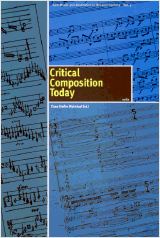Critical Composition Today
New Music and Aesthetics in the 21st Century Vol. 5
Claus-Steffen Mahnkopf (ed.)
209 pages, pb., with musical examples
Critical composition is generally associated with compositional approaches sharing a fundamental left-leaning political stance in relation to their own position in society that can lead to a decided political commitment, and is carried by the conviction that the treatment of musical material must be "critically" oriented. These positions have meanwhile gained astounding recognition, which must now – in the face of the rapid societal changes since the late 1980s and also the "competing venture" of post-modernity, which seemingly denies the younger and middle generations access to a critical form of composition – be problematized. More fundamentally, we must ask how a critical, socio-critical, and ideed politically sensitive mode of composition can be possible at all if it is not to lead to orthodoxy, stubbornness, or a narrow-mindedness; how, then, a cosmopolitan, universal and plural orientation that integrates the experience of the present is possible.
In order to render the transition from a First to a Second Modernity comprehensible, essays have been requested from composers, musicologists, philosophers and sociologists. The contributors to the present volume are the following: Frank Cox, Gordon Downie, Ernst Helmuth Flammer, Harry Lehmann, Claus-Steffen Mahnkopf, Günter Mayer, Dieter Mersch, Rainer Nonnenmann, Nicola Sani, Gerhard Stäbler, and Ferdinand Zehentreiter.
TOC (pdf)

